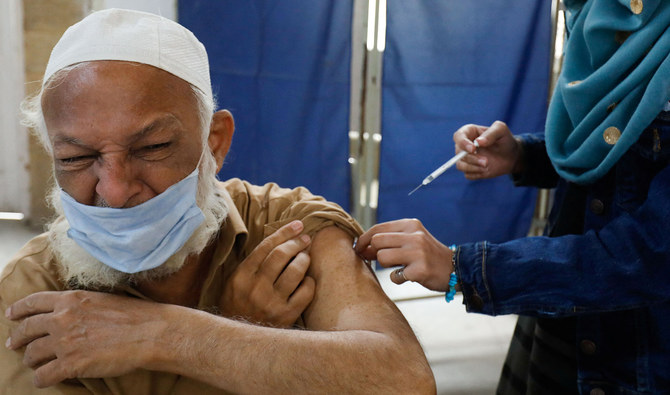ISLAMABAD: Director General Health Dr. Rana Muhammad Safdar said on Tuesday Pakistan would adopt a “bi-pronged strategy” to deal with a fifth wave of the coronavirus in the country and a surge in cases of the omicron variant.
Pakistan reported 708 new coronavirus cases on Monday, according to official figures, the first time daily infections crossed the 700 mark since October 30, 2021. In a statement released that day, the National Command and Operation Center, which oversees the country’s pandemic response, said an omicron-driven fifth wave of the virus was spreading at a “great pace.”
“Government of Pakistan going for bi-pronged strategy of fast tracking vaccination along side standard operating procedures,” Safdar told Arab News. “We would keep on monitoring and mapping new clusters of cases for targeted containment measures.”
The DG health said the threat of the omicron variant was “definitely serious given very high transmissibility and continued challenges of global vaccine equity.”
However, he said it was a good omen that Pakistan had achieved its goal of vaccinating over 70 million of its 220 million population by the end of 2021.
On Monday, Dr. Mumtaz Ali Khan, a focal person at the National Institute of Health in Islamabad, told Arab News the omicron variant was now transmitting locally in Pakistan.
“Vaccination of maximum people, including children above 12 is the only solution to curb its surge,” he said. “We are planning a massive countrywide vaccination campaign in March to boost the immunity of our people against new variants, including the omicron strain.”
In Sindh, the results of 351 COVID-19 tests conducted under a government initiative to determine the prevalence of the omicron variant showed that 175 samples, nearly 50 percent, were infected with the strain, the Dawn newspaper reported, citing a statement issued from the Sindh chief minister’s office.
“Among the cases found infected with omicron, few had a travel history, predominantly from the United Kingdom, US, Dubai, Germany, Saudi Arabia, Nairobi and Angola,” the report read.
Karachi Administrator Murtaza Wahab said coronavirus positivity rate in the southern Pakistani port city had crossed six percent and a majority of the cases were of the omicron variant.


















